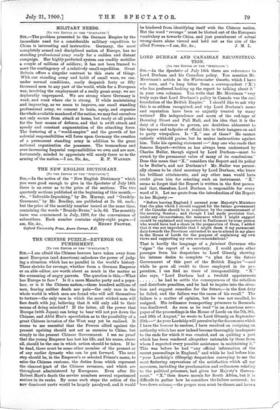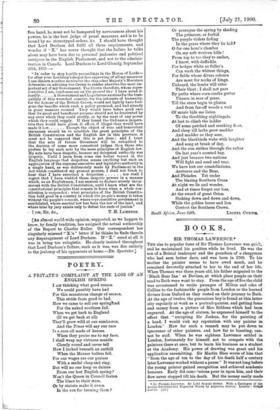LORD DURHAM AND CANADIAN RECONSTRUC- TION.
[To THE EDITOR OF THE "SPECTATOR.'] Sr,—In the Spectator of July 14th there are references to Lord Durham and his Canadian policy. You mention Mr. Merriman's article in the Westminster Gazette, which I have not seen, and "a long letter from a correspondent (` X.') who has preferred looking up the report to talking about it" in your own columns. You write that Mr. Merriman "very truly says that Lord Durham's policy in Canada was the real foundation of the British Empire." I should like to ask why this is so seldom recognised, and why Lord Durham's name and reputation have been so unjustly treated by many writers P His independence and scorn of the red-tape of Downing Street and Pall Mall, and his idea that it is the duty of a Governor to govern, are doubtless abhorrent to the tapers and tadpoles of official life, to their hangers-on and to party wirepullers. Is "X." one of these ? He cannot entirely withhold praise, but he makes insinuations against him. Take his opening statement:—" Any one who reads that
famous Report—written as has always been understood by Charles Buller, though signed by Lord Durham—must be struck by the permanent value of many of its conclusions." Does this mean that "X." considers the Report and its policy to be Bullees, and not Durham's P Mr. Buller was person- ally chosen to be chief secretary by Lord Durham, who knew his brilliant attainments, and any other man would have credit given him for selecting such an instrument. "X." seems to forget that the Report is written in the first person, and that, therefore, Lord Durham is responsible for every word of it. Let me quote from the introduction of the Report to her Majesty :--
"Before leaving England I assured your Majesty's Ministers that the plan which I should suggest for the future government of the Canadas should be in readiness by the commencement of the ensuing Session ; and though I had made provision that, under any circumstances, the measures which I might suggest should be explained and supported in Parliament by some person who would have had a share in the preparation of them, I added that it was not improbable that I might deem it my paramount duty towards the Provinces entrusted to mete attend in my place in the House of Lords for the purpose of explaining my own views and supporting my own recommendations.'
That is hardly the language of a fainiant Governor who " signs " the report of a secretary. I could quote other passages from his despatches to Lord Glenelg showing his intense desire to complete "a plan for the future Government of this part of the British Empire "—and while he gave all credit to those employed in its pre- paration, I can find no trace of irresponsibility, "X." also says, "Lord Durham had a twofold appointment he had to settle the consequences of the rebellion and distribute penalties, and he had to inquire into the situa- tion and suggest remedies for the future,—in the first duty he failed, and the failure was the cause of his recall." The failure is a matter of opinion, but he was not recalled, he resigned. His Ordinance transporting prisoners to Bermuda was disallowed. As soon as he read "in an American news- paper of the proceedings in the House of Lords on the 7th, 9th, and 10th of August," he wrote to Lord Glenelg on September 25th:—" As your Lordship will perceive by the documents which
I have the honour to enclose, I have resolved on resigning an authority which has now indeed become thoroughly inadequate to the ends for which it was created, and on quitting a post which has been rendered altogether untenable by those from whom I expected every possible assistance in maintaining it" This was before he had "any official information of the recent proceedings in England," and while he had before him "your Lordship's (Glenelg) despatches conveying to me the most flattering expressions of the satisfaction which all my measures, including the proclamation and ordinances relating to the political prisoners, had given her Majesty's Govern- ment." "X." then draws morals for South Africa, but it is difficult to gather how he considers the failure occurred; he lays down axioms.—the proper man must be chosen and have a free hand, he must not be hampered by nervousness about his powers, he is the best judge of penal measures, and is to be bound by no stereotyped orders, &c. I should have thought that Lord Durham did fulfil all these requirements, and wonder if "X." has never thought that the failure he talks about may have been due to personal jealousies and political intrigues in the English Parliament, and not to the adminis- tration in Canada. Lord Durham to Lord Glenelg, September 28th, 1838 :— " In order to stop hostile proceedings in the House of Lords— for after your Lordship's despatches approving of all my measures I can discern rtoother motive for the step—her Majesty's Ministers determine on advising the Crown to render abortive the most im- portant act of my Government. The Crown therefore, whose repre- sentative I am, condemns me on the ground thv I have acted il- legally A Government and Legislature anxious for the tran- quillity of this wretched country, for the interests of humanity, for the honour of the British Crown, would not lightly have fore- gone the benefits which such a policy promised, and had already in great measure secured They would have taken good care that its'great and beneficent purpose should not be frustrated by any error which they could rectify, or by the want of any power which they could supply. If they found the Ordinance inopera- tive they would have given it effect, if illegal they would have
made it law Though the object of wise and benevolent statesmen should be to establish the great principles of the British Constitution and the English law in this province, it must not be supposed that this is yet done ; and I trust that the acts of future Governors will be submitted to the decision of some more competent judges than those who profess to try such acts by the mere principles of English law. My acts have been despotic, because my delegated authority was despotic. Until I learn from some one better versed in the English language that despotism means anything but such an aggreiation of the supreme executive and legislative authority in a single hand, as was deliberately made by Parliament in the Act which constituted my present powers, I shall not blush to
hear that I have exercised a despotism nor shall I regret that I have wielded these despotic powers in a manner which, an an Englishman, I am anxious to declare utterly incon- sistent with the British Constitution, until I learn what are the constitutional principles that remain in force when a whole con- stitution is suspended ; what principles of the British Constitu- tion hold good in a country in which the people's money is taken without the people's consent, where representative government is annihilated, where martial law has been the law of the land, and where trial by jury exists only to defeat the ends of justice."
• I am. Sir, , , Sec • T. H. LAB1BTON. [An almost world-wide opinion, supported, as we happen to know, by family tradition, has assigned the actual authorship of the Report to Charles Buller. Our correspondent has singularly misread " X:s" letter if he thinks he finds therein any disparagement of Lord Durham. If "X." erred at all it was in being too eulogistic. He clearly insisted throughout that Lord Durham's failure, such as it was, was due entirely to the jealousy of his opponents at home.—En. Spectator.]



































 Previous page
Previous page